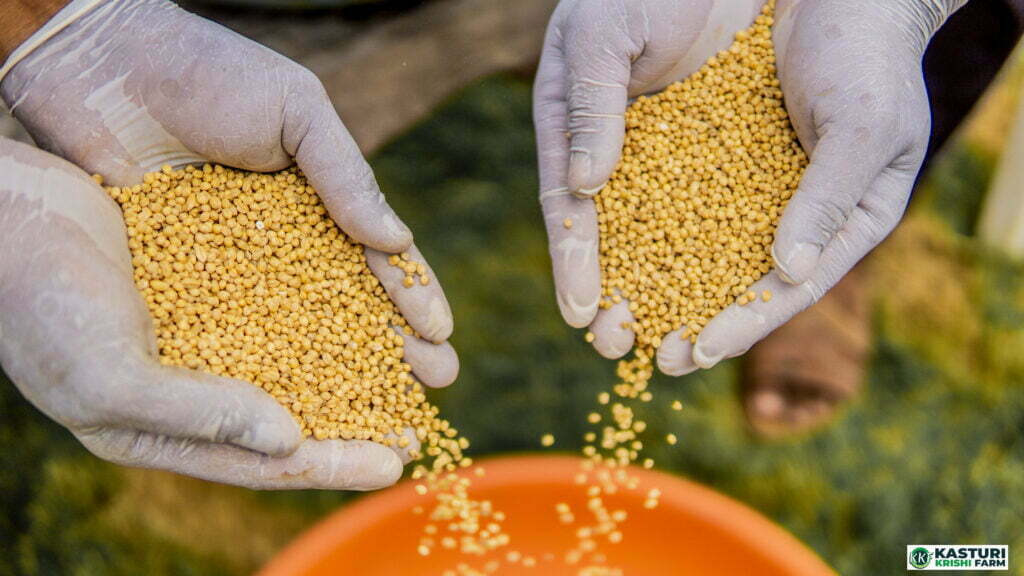(Kasturi Krishi Farm)

What is the meaning of organic food?
Organic food is defined as food that is grown, prepared, and processed without the use of chemicals. Chemical pesticides, fertilizers, and preservatives are not permitted in the manufacturing of organic food. As a result, organic foods are becoming increasingly popular as more people get interested in knowing more about their advantages. One of the key reasons for organic food’s surge in popularity over the last decade is that the general public feels it is healthier than conventional food.

There Are 15 Advantages to Eating Organic Food
1 Pesticide-Free: Chemical pesticides have been associated with malignancies of the breast, prostate, and other organs, as well as non-Hodgkins lymphoma, leukemia, infertility, convulsions, immunological and endocrine abnormalities, Parkinson’s disease, and depression.
2 It’s More Delicious: True, if you’re used to the addictive properties of junk food additives like processed sugar and MSG, it might not taste as wonderful. However, after only a short period of time, your body will crave truly wholesome food. You will, without a doubt. And then everything will have a foul aftertaste.
3 Heart health has improved: When animals are grazed only on natural grass, they have higher CLA (conjugated linoleic acid). Herbivores eat natural grass, which takes the sun’s energy through photosynthesis and turns it into the most sought organic CLA. CLA is a heart-healthy fatty acid that has the potential to increase cardiovascular protection, and it’s more abundant in the meat and milk of pasture-raised animals.
4 Chemically prevented: Herbicides and fertilizers have been linked to a variety of malignancies, immunological problems, infertility, heart disease, hypertension, and a variety of other illnesses.
5 Content of antioxidants: A number of scientific studies have shown that antioxidants, particularly those found in organic foods, have positive impacts on general health. This is because organic foods are free of foreign chemicals that might react with vitamins, organic components, and minerals, diminishing the antioxidants’ beneficial effects.
6 Resistance to antibiotics: Humans are prone to a variety of health problems and diseases, and they must take precautions to stay healthy most of the time. When a new strain of virus or bacteria is discovered, this is accomplished by receiving a variety of immunizations and antibiotic medications. Vaccines, growth hormones, animal byproducts, and antibiotics are used to treat and feed non-organic food sources (particularly livestock and feeds).
7 Pesticides are being reduced: Chemical pesticide exposure has been associated with a number of diseases and disorders, including cancer, digestive problems, headaches, ADHD, birth defects, a weaker immune system, and even premature mortality. Organic foods are pesticide-free, which makes them the superior choice for greater overall health. Pesticides have the ability to keep some pests away from crops, but they also include toxic substances like organophosphorus.
8 Immune system strengthening: Traditional or industrial farming practices try to boost production and agricultural output by any means necessary. Using genetic alterations and growth hormones to produce more cereals, meat, and larger fruits, for example, appears to be a solution to some of the world’s food poverty problems. Long-term consequences include increased susceptibility to allergens and a significant decline in immune system strength, despite the fact that the effects are not yet apparent.
9 Organic items are devoid of toxins: To keep pests and diseases at bay, organic farming does not use any harmful chemicals. All of the techniques are natural, thus there is no risk to the consumer. Chemical pesticides, fertilizers, herbicides, and artificial growth hormones are all prohibited on an organic farm, therefore biomagnification is reduced. As a result, organic food products are free of chemical contaminants that are harmful to one’s health.
10 Consumption of foods that are high in nutrients: Organic foods, such as organic beef, organic milk, organic fish, and organic poultry, contain more nutrients than conventional agricultural foods since they are free of genetically modified ingredients. They’re also given time to mature and the best possible natural growing conditions, making them incredibly nutritious. Because soil life and health provide the best mechanism for crops to receive soil resources, organic foods always have a high vitamin and mineral content.
11 There are no genetically modified foods in organic foods: Organic foods are GMO-free, which means they haven’t been genetically modified in the wild. Food genetic engineering is a major source of concern in today’s world. They are foods or plants that have had their DNA altered in ways that do not occur naturally, mainly to increase pesticide/herbicide resistance. Food safety activists are concerned that long-term study has not been undertaken to establish their safety, despite the lack of clear proof of their risks.
12 Environmental protection: Organic foods are grown locally and have very little impact on the natural resources that support healthy living. Organic farming uses less toxic chemicals, resulting in less contamination of water, air, and soil, resulting in a healthier and safer environment. To be more specific, organic farming reduces the long-term effects of air, water, and soil pollution on human health.
13 You may rest assured that the food you’re eating is fresh: Organic food is produced, processed, and prepared according to very tight guidelines. Chemical preservatives will not be found in organic foods at any time. As a result of the lack of preservatives used to extend the shelf life of organic food, it is often fresher and more flavorful. The majority of organic food is sold or available locally, close to where it is produced.
14 Food-borne disease is less likely: The animals are unwell because a large percentage of them have been medicated, vaccinated, and given animal byproducts in order to increase their productivity in order to meet ever-increasing agricultural demands. This technique is known as concentrated animal feeding operations (CAFOs), and it results in the transmission of lethal drug-resistant diseases to end consumers when food items are consumed. Choosing organic food is the best approach to avoid food-borne illness outbreaks.
15 Toxic metal levels are lower: By now, it should be obvious that whatever we eat is derived indirectly from the soil, as well as other physical environmental interactions. As a result, the fact that organic farming does not employ agrichemicals in food production means that harmful metal intake is reduced. Organic crops contain 48 percent lower amounts of the hazardous element cadmium than conventional crops, according to new research.

FAQ
1 What are the health benefits of eating organic foods?
Ans – Not only can organic farming assist to lessen public health hazards, but growing data reveals that organically cultivated fruits, vegetables, and grains are high in nutrients like Vitamin C, iron, magnesium, and phosphorus, with reduced exposure to nitrates and pesticide residues.
2 What are six reasons to buy organic foods?
Ans – Chemicals should be avoided.
Increase your nutritional intake.
Get a better flavor
GMOs should be avoided.
Hormones, antibiotics, and medications found in animal products should be avoided.
Maintain the health of our ecosystems.
3 Is eating organic food better for your health?
Ans – People with sensitivities to foods, chemicals, or preservatives may discover that their symptoms reduce or disappear when they eat solely organic foods. Pesticides are less prevalent in organic vegetables.
4 What is the advantage of organic farming?
Ans – Organic farming utilizes fewer pesticides, minimizes soil erosion, reduces nitrate leaching into groundwater and surface water, and recycles animal waste back into the farm as compared to conventional agriculture. These advantages are offset by increased consumer food costs and generally lower yields.

